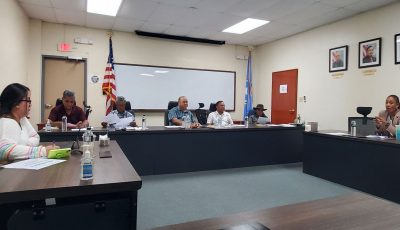CNMI to impose tax on casino
Acting governor Victor B. Hocog said the CNMI government is looking to impose additional taxes on the new gaming industry once the casino begins its operations on its permanent facility at the Imperial Pacific Resort.
Vice speaker Janet U. Maratita (R-Saipan) introduced House Bill 20-31 or an act that would impose a 5-percent tax on all gaming revenues in the CNMI in order to prevent any deficit in a significant and consistent manner.
Hocog said the idea of a taxing system similar to the Tinian Dynasty & Casino also came up when they initiated legislation that allowed a lone casino on Saipan. “The magnitude of the investment was so big and what former governor Eloy S. Inos have negotiated is what we take to be the starting point.”
“Back then we have a lot of compelling issues and problems that need to be addressed immediately. For most of it is the [NMI] Retirement [Fund] pension plan. We agreed with what then governor Inos came up with during the negotiations to ensure Retirement would benefit or retirees would be saved from being depleted.”
He added that during the course of the negotiations they asked the investor to provide an upfront of $30 million to take care of some problems. The Commonwealth Utilities Corp., in October 2014, got $10 million from the money and was used to pay Saipan residents’ utility bills.
Hocog said the CNMI government is hoping that the casino would generate the revenue that they were expecting, income that would benefit the people of the Commonwealth, once the casino is fully operational.
“To make sure we take care of the problems ahead of us and those in the past. The result of the casino license fee to make sure we provide the retirees with the 100 percent benefit,” said Hocog.
“To impose a [higher] tax aside from what they had already assisted to us during the time when we have nothing, I think we should give them time to establish a permanent footing that even them and us will be comfortable enough that we will not experience the same things 10 years ago.”
He added that the CNMI would not have addressed some of the issues back then if not for Imperial Pacific International LLC’s investment. “Where do you think the retirees would be or most of the government employees? Not only we’re going to experience a reduction in working hours but also in furlough.”
“But because of this, we were able to sustain and we have not issued a reduction in hours like an austerity measure. Now that we do realize that we have revenue, let us give them time to stabilize their development. I know they have been hit by a lot of glitches, but it doesn’t mean that we will not come back and ask for more taxes that would benefit the people.”
House Bill 20-31
Maratita’s bill, if it becomes law, would impose a 5-percent tax on the gaming revenues just like in other countries were a casino is operating. The bill is already in the House Ways and Means committee of chair Rep. Angel A. Demapan (R-Saipan).
House minority leader Rep. Edwin S. Villagomez (Ind-Saipan) said Maratita’s bill is still being discussed since House legal counsels are at the opposite sides of the said measure.
“One is saying it is unconstitutional to apply it to IPI and saying it won’t apply to IPI. The other legal opinion that it will [apply to IPI] and it does when it becomes a law,” said Villagomez.
“The only way into this is to amend the contract. The vice speaker has requested two written analysis on both opinions so she could have a solid information to look at.”
Maratita said the new gaming industry is largely un-taxed and she thinks HB 20-31 would tax them in a fair and reasonable manner. “The exclusive license fee that is paid currently is arguably a fair price for a legal monopoly, but even an entity that enjoys exclusive gaming rights should be paying their fare share of taxes.
Gov. Ralph DLG Torres said in an earlier statement that the casino would be taxed. “When you encourage casino gaming, you start an investment and eventually we should tax it. No ifs, no buts. Definitely we will tax them, but we need them to get the investment started first.”



























